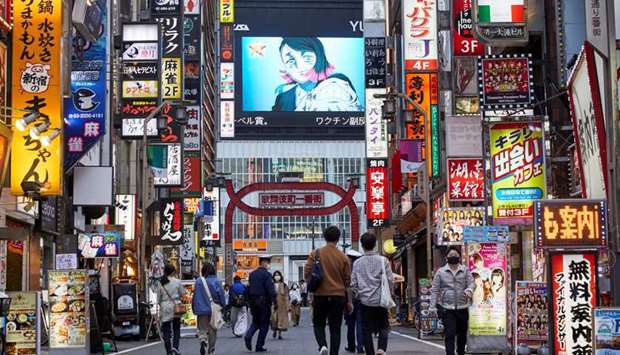* Emergency state sought from April 25-May 11
* Curbs cover almost a quarter of Japan's population
* PM Suga to announce at 1100 GMT news conference
Japan will declare ‘short and powerful’ states of emergency for Tokyo, Osaka and two other prefectures on Friday as the country struggles to contain a resurgent pandemic just three months ahead of the Olympics.
Under a new state of emergency for April 25 to May 11, the government will require restaurants, bars, and karaoke parlours serving alcohol to close, and big sporting events to be held without spectators, Economy Minister Yasutoshi Nishimura said.
Breaching the restrictions will in some cases carry penalties under a recently revised law, he said.
‘We absolutely have to limit the movement of people, and we have to do it decisively. We need powerful, short and focused measures,’ he said, asking people to remember the lockdowns of last spring and stay at home.
The new restrictions are expected to be formally approved at a government task force meeting later on Friday and announced by Prime Minister Yoshihide Suga at an 8 p.m. (1100 GMT) news conference.
Department stores, cinemas and other commercial facilities larger than 1,000 square metres will need to close while companies will be asked to make greater allowances for people to work-from-home. Schools will remain open.
The state of emergency - a third round for Japan that would also include Kyoto and Hyogo - would last through the ‘Golden Week’ holidays and cover nearly a quarter of the population, in a further hit to the tourism and services industries.
‘We will be asking for illuminations and neon signs to be turned off,’ Tokyo Governor Yuriko Koike told a news conference.
‘It will be dark at night,’ she said, adding she hoped the initiative would discourage people from going out at night. Koike also asked non-residents to refrain from entering Tokyo as much as possible.
Japan has so far avoided an explosive spread of the pandemic that has crippled many countries. There have been a total of about 550,000 cases and 9,761 deaths, which is significantly lower than the numbers seen in other large economies.
But the latest rise in infections has stoked alarm with an explosive surge in the mutant variant and a critical shortage of medical staff and hospital beds in some areas, while Japan's vaccination drive remains sluggish.
Organisers of the Tokyo Motor Show on Thursday cancelled the marquee event for this year, in a move likely to raise more questions about the government's insistence that the Tokyo Olympics will go ahead this summer.
Tokyo 2020 organisers said on the same day that a policeman who worked with the torch relay had tested positive for the virus, in a first for the event.
‘To make the Games safe and secure, we must contain the spread now and create a suitable environment,’ Koike said, according to Kyodo News.
Tokyo reported 759 new infections on Friday, down from 861 a day earlier when the tally hit the highest since Jan. 29, during the previous state of emergency.
Several other prefectures remain in a ‘quasi-emergency’ state of targeted infection controls, and Nishimura said the duration would also be extended to May 11 for some.

